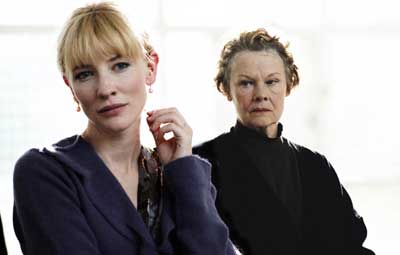When you have Judi Dench and Cate Blanchett as the lead actresses, it's more
than
reasonable to expect that the film will be bolstered by powerhouse
performances, and that's exactly what you'll get here. Actually,
of the two actresses, it's Dench that steals the show, fully imbuing her
character with a mixture of sympathy and creepiness, as her passions
and loneliness drive her to obsession over things she wishes to possess, but
will probably never have. The film is framed by voiceovers, mainly in
the form of entries in the very private journal of Barbara, which she writes
in copiously, detailing all of her latest schemes and conquests. Dench
consummately portrays the dried-up and bitter old maven, externally frail and
meek, but inside, she is as wily and morally decrepit as you'd ever want to
meet.
Patrick Marber, who is no stranger to controversial material, having adapted
his play into film script with Closer, makes
some alterations to the more subtle tone in Heller's book, but does make it
more compelling for the purpose of a feature film experience. The
storyline is somewhat reminiscent of the classic Hollywood thrillers of the
1940s and 1950s, and in particular, it is akin to the thin relationship that developed
between Guy and Bruno in Hitchcock's Strangers on a
Train, with the weaker of the two having seemingly no way out of the
stronger "friend"'s well-meaning but deadly manipulative grip.
The story itself isn't much different than similar stories you may have read
in recent years about female teachers who have affairs with their teenage male
students, but Notes on a Scandal really isn't about the
inappropriateness of the affair so much as the nature of lust, trust, and the
bedfellows that are brought together through the sharing of a secret that can
shatter a life completely should it ever be revealed. Notes is a very adult film,
and quite contemporary, so viewers expecting a Dench/Blanchett film to play
things for more conservative audiences should take note of its subject matter
before attempting. You'll detest Barbara's motives but oddly admire her resolve,
and this conflict in our feelings toward her makes for a truly fascinating character study of the nature of loneliness and
what some people will do to gain the companionship, and perhaps the ownership,
of another person of merit.
Richard Eyre's (Stage Beauty, Iris)
direction is tight and virtually lag-free, treading the line between drama,
thriller, and black comedy in a very adept fashion. Philip Glass (The
Illusionist, Undertow) coats the film with
his usual whimsical style, and though the film might be deemed as too slight
in its subject matter to merit such heavy-handed compositions, the music is
actually completely in keeping with the tragic allusions underneath, with
motifs based on magic (wizard hats, old cats, strands of hair, and gold stars
tie in to the coven-like relationship of the women) as well as Biblical
references (Sheba is short for Bathsheba, the Old Testament woman seduced;
Barbara's last name is Covett, and covet she most certainly does).
While the film will no doubt garner accolades for the performances of the two
leads, ithey aren't wasted in this top-drawer chilling drama, which is firmly one of the better films of 2006.
With sharp characterizations, nasty turns of events, and fine-tuned
undercurrents that shed light
the twisted nature of relationships, particularly between those of unequal age and
station, it shows that some friendships are born more out of neediness and
power
than out of fondness and familiarity. The lesson learned is simple, but
profound: It's human nature to want what you
shouldn't have, but when you finally in a position to possess it, you may find
yourself the one possessed if you are not being able to let it go.

